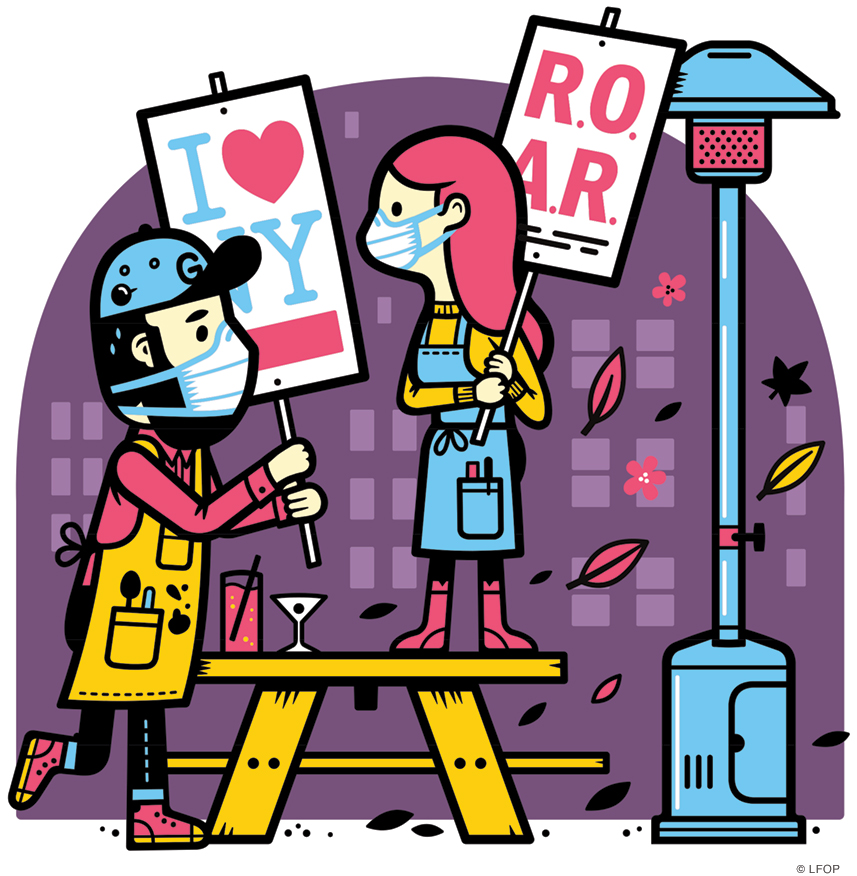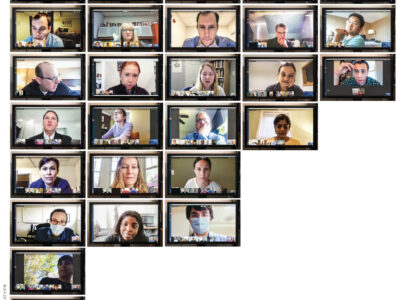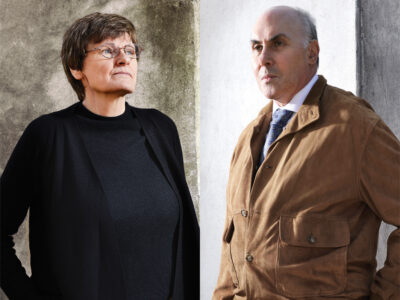
Decimated by the pandemic, some young restaurant industry leaders are fighting back.
When New York City restaurants were ordered to shut down at the start of the COVID-19 pandemic a year ago, Camilla Marcus W’07 had only one thought: We need to organize. “Everyone I knew was firing or furloughing their teams. I was scared for New York City, and I was scared for our restaurants,” says Marcus, who was then the owner of West~bourne, a vegetable-inspired establishment in SoHo. “Anyone in the industry saw the writing on the wall: we are at the epicenter of this crisis.”
New York restaurant owners and chefs, who employ about 315,000 people, are famously competitive, known more for guarding their turf than coming together. But within days of the initial lockdown, Marcus got 30 of them on a call to decide what to do—including some of the top restaurateurs in the city—and soon cofounded a group called ROAR (Relief Opportunities for All Restaurants).
Working quickly, they put up a petition on Change.org outlining what they wanted from local government, including payroll tax relief and ways to incentivize lease restructuring. Ten days later they set up a fund with the Robin Hood Foundation to provide immediate cash for out-of-work restaurant workers, which has so far raised more than $2.5 million. And with the help of a lobbyist, they worked to convince the state to allow outdoor dining in the first phase of the city’s summer reopening—quicker than originally planned. They also blocked smaller but significant proposals like one forcing restaurants to give out hazard pay. “When all of these businesses are bankrupt, and their employees are unemployed, paying someone 75 dollars an hour will put someone out of business overnight,” says Marcus, who is joined at ROAR by her former colleague and fellow Quaker Nate Adler C’11 W’11, owner of the quirky Brooklyn restaurant Gertie. “We fought a number of government proposals that would have been a nail in the coffin.”
The efforts have been voluntary and ad hoc, but ROAR has been in discussions to figure out how to become a formal institution with a full-time team. “Before this, we did not have an appropriate seat at the table in politics,” Marcus says. “Hopefully we can pave the way for a future that is much more collaborative.”
Even at Penn, Marcus was cutting her own path. She decided to create her own major, one that combined all her interests. “I was a painter, but I was also very advanced in accounting,” she says. “I was into psychology and economic behavior.” The University didn’t sign off on her plan until her senior year when she made it clear she would rather not graduate than register a conventional major. “I got to hold my own flag at graduation because it was my own major,” she says.
After college, she attended New York’s French Culinary Institute (now the International Culinary Center). She had always loved cooking in college, making regular meals for her six housemates and her boyfriend (now husband Josh Siegel C’07) and his fraternity brothers. “My Wharton guidance counselor was pretty shocked,” she says. “But it was always something I wanted to do.” She then enrolled at New York University for a four-year JD-MBA program, explaining, “It was the recession. I thought this was a great hideout plan.”
Marcus worked in restaurants on the side throughout her time at NYU, and after graduation, landed a gig running business development at Danny Meyer’s Union Square Hospitality Group, which has created some of New York’s most popular restaurants.
After growing frustrated with writing business plans for other restaurateurs, Marcus left to open her own establishment. West~bourne did many things differently, from donating a percentage of profits to local hospitality training programs to setting out to be the first zero-waste restaurant in Manhattan. But it was only open for two years before Marcus had to close permanently in the spring of 2020. “Our space turned from a gem to a lemon during the pandemic,” she says. “We were very small, very narrow, an open kitchen, communal seating, very limited outdoor space.
“We were set up to have a good year until March,” Marcus adds. She’s since been focused on catering, as well as looking for her next restaurant, perhaps in Los Angeles, where she’s originally from and recently moved.
It was at Union Square Hospitality Group that Marcus met many people who would later become involved in ROAR—including Adler, who was a few years behind her at Penn. “Danny Meyer used to say all the Penn people know each other,” Marcus says. “Or if you don’t, you become instant friends.”
Adler had made a name for himself on the Penn campus his senior year by opening Kitchen@Penn, which provided healthy, locally sourced, home-cooked meals for takeout or delivery. “I rented a kitchen on 46th and Baltimore,” he says. “It was 12 dollars an hour. I can’t even do the math of how much I pay in rent per hour in New York City now.”
After graduation, he worked his way up to management at Stephen Starr’s Buddakan and Danny Meyer’s Blue Smoke, before opening Gertie in Williamsburg. The fast-casual restaurant is convenient but hip—one of the few places you can dine on matzo ball soup while listening to live DJs. “My idea was to sort of bring an identity to what New York cuisine is,” he says. “It is a very personal concept for me since I grew up here. It’s named after my grandmother.”
During the pandemic, Gertie has survived with a reduced staff and a landlord who has decreased rent by 50 percent. Adler has also tried to get more diners there with pop-up events hosted by guest chefs, many of whom have lost their own restaurants, and community initiatives that have included locals writing postcards to voters before the election and fundraisers for ROAR’s employee relief program. “We need to think outside of the box to use these big, expensive spaces in more efficient ways,” he says.
While Marcus (who cooked at Gertie after losing her own restaurant) continues to lead all aspects of ROAR, Adler is focused mostly on political battles. “Even prior to COVID, I had seen all these laws getting passed, and all of these inequitable policies that restaurants literally had no say in and then had to spend more money and become less profitable,” says Adler, who studied political science at Penn and interned for now-Senate Majority Leader Chuck Schumer. “I was sick of it.”
One of his biggest accomplishments has been working with the state government’s economic development team to communicate what would help restaurants the most. “There was a point in the summer where they wanted to open inside dining 25 percent, and I told them the consensus at ROAR was that it’s not worth it,” he remembers. “We would rather continue to have robust outdoor dining and be able to sell liquor and wine and have some form of relief.”
Restaurants still have a long struggle ahead. Indoor dining in New York City was suspended for a couple of months in mid-December, just as the weather turned frigid. The federal stimulus package on December 27 included no industry-specific money for restaurants. Walking around the city it can feel like new restaurants are closing permanently every day. “This year has been full of unimaginable loss, core-shaking heartache, and constant confusion,” ROAR wrote to its 17,000 followers on Instagram in December.
“It has also been full of inspiring camaraderie, deep solidarity and energetic New York spirit. 2020 bought us together, as a community, and united us under one goal: supporting the New York restaurant community. … At ROAR, we are just getting started.”
—Alyson Krueger C’07




